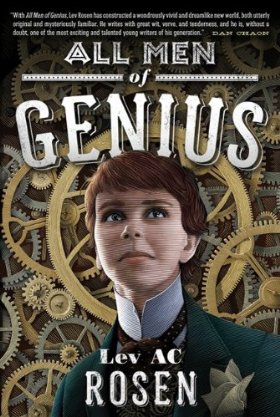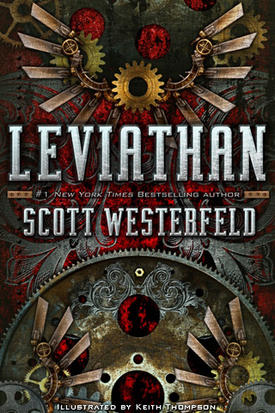
Airborn
by Kenneth Oppel
“Why do you need to fly so much?” she asked.Matt Cruse is the cabin boy aboard the airship Aurora and he loves it. When his father died serving on the Aurora, Matt took his place. He feels more at home in the sky than on the ground, and he has earned the reputation of being lighter than air and a smart, capable crew member. When the Aurora rescues a dying old man in a battered hot air balloon who speaks of strange flying creatures, Matt is ensnared in an adventure. Together with the man's granddaughter, Kate, they must sail the skies, battle pirates, and save the ship, all while searching for the elusive creatures her grandfather saw.
“If I don’t, it’ll catch up with me.” The words just came out.
“What will?”
I took my hands from my face, panting. I stared out at the storm.
“Unhappiness.”
This was a fun book! A rollicking high seas adventure, mixing Robert Louis Stevenson with a bit of Jules Verne. It reminded me a bit of the Leviathan trilogy, but lacked the depth of character and scope and detail that made that series so great. While Leviathan was a dirty, gritty, wartime story, the Aurora is a luxury liner. The story is a frivolous peace-time adventure. That is not to say the stakes are not high. Towards the end of the story, after much sneaking off to explore and outwitting authority figures, the danger becomes very real, and Oppel is not afraid to kill a few people to remind you how real it is.
The worldbuilding did feel a little sloppy to me. We had airships lifted by the new element, hyrium, with its own rules, and some exciting cryptozoology, but we don't learn much about the rest of the world. It appears to be simply a steampunk novel with airships and message tubes, with everything else simply Victorian. However, there are subtle name changes that make you wonder what kind of alternate universe we are in: Pacificus and Atlanticus oceans, Angleterre, instead of England.
The characters were a bit surfacey. Kate is the plucky, headstrong Victorian girl who wants to be a scientist and doesn't care if her recklessness causes problems for other people. Matt has the dark undercurrents of pride and jealously that were so successful with Victor in Oppel's His Dark Endeavor but the flaws did not pay off as significantly in Airborn. He is simply your Everyman with emotional baggage and something to prove. I will say, though, that the captain of the ship, even though he was rather one dimensional, had an excellent management style!
I can picture how amazing this book would be if Oppel delved just a little more. The issues of jealousy between Matt and another crew member. The evil pirate captain and those he loves. Preservation versus public access in regards to a rare species of animal. Trying to rebel and prove yourself even though it endangers those around you. Loyalty to your home versus saving someone you care about. All of these could be mined for so much more emotional gold.
Yet, however superficial the adventures seems at times, everything, even the smallest detail, comes back in a big way, and will either pay off emotionally or become a linchpin to the plot. It is fascinating to pick up on the clues as you go, or have the "Oh my God! The thing from before!" moment when one has slipped by you.
All in all, a nice, light, fun, easy adventure read for the summer.
Books Like This
Stardust by Neil Gaiman
Leviathan by Scott Westerfield
This Dark Endeavor by Kenneth Oppel







